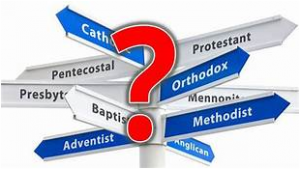
A Troubled Heart Remembers
(Psalm 77)
Mike Johnson
 It is common for Christians today to become discouraged when facing hardships and wonder why God has not helped them. In Psalm 77, the writer seems to be facing this situation in dealing with some very distressing circumstances. It is uncertain what the troubling problem is, but clearly, he is in despair. He knows that God has helped him in the past and cannot understand why the Lord is not helping him now. In this Psalm, the writer expresses his feelings and frustrations frankly and forthrightly, pointing out that although he had prayed and wept throughout the night, he still did not receive help from God and felt Jehovah had deserted him. However, he travels a journey in the Psalm from hopelessness to happiness — from despair to determination. The Psalm tells us how we may obtain comfort and peace in times of distress.
It is common for Christians today to become discouraged when facing hardships and wonder why God has not helped them. In Psalm 77, the writer seems to be facing this situation in dealing with some very distressing circumstances. It is uncertain what the troubling problem is, but clearly, he is in despair. He knows that God has helped him in the past and cannot understand why the Lord is not helping him now. In this Psalm, the writer expresses his feelings and frustrations frankly and forthrightly, pointing out that although he had prayed and wept throughout the night, he still did not receive help from God and felt Jehovah had deserted him. However, he travels a journey in the Psalm from hopelessness to happiness — from despair to determination. The Psalm tells us how we may obtain comfort and peace in times of distress.
Superscription
The heading says, “To the Chief Musician. To Jeduthun. A Psalm of Asaph.” (Some translations say “for” instead of “to.”)
The Psalm was to Jeduthun, who appears in the heading of two other psalms (39, 62) by David. He was one of David’s chief musicians and one of three choir directors, along with Asaph (the writer of this Psalm) and Heman (1 Chr. 23:1-6; 25:1-3). He is also called the “King’s seer” (2 Chron. 35:15). This musical position seems to have been inherited as his sons assumed it. Many scholars feel this Psalm was written during the captivity instead of the times of King David. They may also take the view that the name in the heading refers to a musical instrument or a style of tune introduced by Jeduthun.
According to the Superscription, Asaph wrote this Psalm. He was another one of the three chief musicians during the time of David. Besides Psalm 77, someone named Asaph wrote eleven other Psalms. However, possibly the writer of this Psalm is not the same person who served David. This Asaph, according to many, only wrote Psalms 75, 77, and 82. However, consider the following.
On this title, we may observe that both Asaph and Jeduthun were celebrated singers in the time of David, and no doubt were masters or leaders of bands which long after their times were called by their names. Hence, Psalms composed during and after the captivity have these names prefixed to them. But there is reason to believe also, that there was a person of the name of Asaph in the captivity at Babylon. The author must be considered as speaking in the persons of the captive Israelites. It may however be adapted to the case of any individual in spiritual distress through strong temptation, or from a sense of the divine displeasure in consequence of backsliding. (from Adam Clarke’s Commentary, Biblesoft.)
Seeking God & Remaining Troubled
(Verses 1-3)
In verses 1-3, he says, “(1) I cried out to God with my voice — to God with my voice; and He gave ear to me. (2) In the day of my trouble I sought the Lord; my hand was stretched out in the night without ceasing; my soul refused to be comforted. (3) I remembered God, and was troubled; I complained, and my spirit was overwhelmed.”
Although the Psalmist was despondent and, as we shall see, felt God had turned His back on him; still, he turned to the Lord — he “cried out” to Him (1a). Consider some other directions he could have gone but did not. He did not:
- go to other people and complain,
- try and drown his sorrows with alcohol or drugs,
- pursue immortality, or turn to recreation with an “eat, drink, and be merry philosophy,”
- try and numb his pain by sinking himself in his work.
Instead of the above, as a believer, he “sought” God (2a) and sought to “pray away” his despair and discouragement. A much-loved hymn, written by Joseph M. Scriven in the 1800s, called “What a Friend We Have in Jesus,” has these immortal words. “Oh, what peace we often forfeit, / Oh, what needless pain we bear, / All because we do not carry / Everything to God in prayer.”
It is also clear that the writer audibly and fervently prayed. He states twice that he cried out to God with his “voice” (1a), which no doubt shows intensity. (The ESV translates it as “he cried aloud.”) He also sought the Lord “with his hand stretched out” (2b), which would be another way to express praying and appealing to God, and his prayers were “in the night without ceasing.” The two verses depict intense fervent prayer throughout the night.
It is not uncommon for people to speak about how much better they feel after praying — they experience a peaceful assurance. For example (Ps. 3:4), after talking about people who said it does no good to pray, David responded, “I cried to the Lord with my voice, and He heard me from His holy hill.” He then cites what God has done and calls Him his shield, sustainer, and deliverer. In another case, the writer said after crying out to God (Ps. 30:2), “O Lord my God, I cried out to You, and You healed me.”
However, in Psalm 77, after stating how he had pled with God (1-2), Asaph was still troubled instead of feeling refreshed. The NASB translated verse 3 as, “When I remember God, then I am disturbed; when I sigh, then my spirit grows faint.” He felt God had heard him (1c), so that was not the problem. He probably did not know of any sin he had committed, which would have resulted in God not hearing him. (Note Isaiah 59:1-3.) So why has God not responded? Why has God “deserted” him, he asks? He is without an answer. His soul was not comforted, his spirit grew weaker, and he remained troubled.
Will God Cast Off His People Forever?
(Verses 4-9)
His bewilderment continues “(4) You hold my eyelids open; I am so troubled that I cannot speak. (5) I have considered the days of old, the years of ancient times. (6) I call to remembrance my song in the night; I meditate within my heart, and my spirit makes diligent search.”
He says that God holds his “eyelids open” (4a). So often, when troubled, continuous thoughts about a problem keep one from sleeping. Sleep can be a relief when a person is full of anguish, but the Psalmist is so full of grief that he cannot do so.
Continuing, Asaph further describes his anguish.
- “I am so troubled that I cannot speak” (4b). The Psalmist “cries out,” is unable to sleep, and now he is unable to speak. He is sleepless and speechless through grief. His state of mind seems to be due to him not understanding God’s ways.
- “I have considered the days of old, the years of ancient times” (5). What does he refer to here? This statement could refer to an earlier part of his life when he experienced the goodness of God. Or, it could refer to events from the distant past in which God helped his ancestors. However, remembering the past does not seem to be helping Asaph much at this point, but it will later in the Psalm. Nevertheless, it is good to remember God working in our lives and people’s lives in the Bible.
- “I call to remembrance my song in the night” (6a). He seems to be remembering back before his time of anguish, during “the days of old,” when he was helped by singing songs in the night. These had been helpful during happy times and should be beneficial when times were sad. However, he is in such despair that they do not seem to help him now. His remembrance of all God had done in the past perhaps only makes him think that God has now cast him off forever.
- “I meditate within my heart” (6b). Asaph seriously thought about the situation, but he is still troubled.
- “my spirit makes diligent search” (6c). This phrase seems parallel with the previous. His spirit/heart meditated or searched. Despite this, he was still troubled, and only questions remained.
In light of the frame of mind displayed above, he asks six questions about God.
Consider them now.
- Will the Lord cast off forever? (7a) He is convinced God has cast him off, but he wonders how long this rejection will last. Will it last forever?
- Will He be favorable no more? (7b) Has he seen the end of God helping? Often people who face trials think they will never end.
- Has His mercy ceased forever? (8a) Most translations say “love” instead of “mercy.”
- Has His promise failed forevermore? (8b) Will the fulfillment of his promises ever be seen again?
- Has God forgotten to be gracious? (9a) The Scriptures say God is merciful and gracious (Ps. 103:8; Ex. 34:6). The Psalmist suggests that with him, the Lord has not been. In this instance, as he attributes a human trait to God, the writer seems to be getting into dangerous territory.
- Has He in anger shut up His tender mercies? (9b) Perhaps the reason for God’s lack of response, the writer postulates, is due to Him being angry for some reason.
In summation, the writer contemplates the following. “God continues to not respond to me.” He inquires, “Will I be cast off from Him, not receiving the benefits of His promises, favor, and mercy from now on?” He asks, “Will I ever see His grace and tender mercies again?”
The Restoration
(Verses 10-14)
In these verses, a transition will occur as he goes from dismay to confidence in God. He has been going down a road that may have even led him to disbelief in God. He has been standing on the edge of an “abyss.” The change happens as he engages in “productive” remembrance (c.f. verse 3) of the great works of God. He goes from what he felt to how he truly believed.
Verse 10 says, “And I said, “This is my anguish; but I will remember the years of the right hand of the Most High.” He says, “This is my anguish. . . ” (The NASB says, “This is my grief.”) He looks back to what he had said earlier and realizes the fault lies with himself and then he goes on to remember God’s great works. (The NIV says, “Then I thought, ‘To this I will appeal: the years of the right hand of the Most High.’”) Remembering God’s “right hand” indicates the power and strength of the Lord.
Verses 11-12 say, “(11) I will remember the works of the Lord; surely I will remember Your wonders of old. (12) I will also meditate on all Your work, and talk of Your deeds.” These verses reveal his solution, a three-step process. The writer says he will remember God’s works/wonders, meditate on them, and then talk about them to others. (However, most translations render the word “talk” by “muse” or “meditate,” which continues the concept of remembering.) Verses 11-12 are similar to verse 6 but there, he is still in a state of despair. (The book of Psalms often mentions God’s wondrous works, e.g., 78:4, 11, 32; 107:8, 15, 21, 24.)
Next, consider verses 13-14. “(13) Your way, O God, is in the sanctuary; Who is so great a God as our God? (14) You are the God who does wonders; You have declared Your strength among the peoples.”
After stating his desire to remember God’s great works, he says His way is “in the sanctuary.” On another occasion, Asaph, being perplexed due to the prosperity of the wicked, said, “When I thought how to understand this, It was too painful for me — Until I went into the sanctuary of God; Then I understood their end” (73:16-17).
Most modern translations, however, translate the word “sanctuary” by the word “holy” or “in holiness.” Thus, he goes from what he expressed earlier; where he is questioning God, showing frustration and a lack of faith; to now understanding that God’s way is indeed holy and right.
In verse 14, the writer uses the present tense, “You are the God who does wonders.” The use of the tense can be compared to verses 11-12, where he uses the past tense regarding remembering God’s works. Even today, based on our knowledge of the past about the deeds of God, we can conclude what he does today. One writer put it like this:
His love in time past
Forbids me to think
He’ll leave me at last
In trouble to sink;
Each sweet Ebenezer
I have in review
Confirms his good pleasure
To help me quite through.
(John Newton)
Verse 14b speaks of God declaring His strength “among the people.” Examples of Him doing this are in the following verses as the author discusses the deliverance of God’s people from the Egyptian bondage.
Three Examples of God’s Deliverance
(Verses 15-20)
The first case is in verse 15, which says, “You have with Your arm redeemed Your people, the sons of Jacob and Joseph.” As we will see by what follows, this verse speaks generally of the escape of the Jews from the Egyptian bondage.
The verse says that God’s arm “redeemed” His people. The Scriptures often speak of the escape from Egypt as a “redemption” (Ex. 6:6; 15:13; Deut. 7:8; 9:26). Further, it is interesting that the writer calls God’s people by a rarely used designation, “the sons of Jacob and Joseph.” One writer explained this infrequent description.
Jacob is mentioned because he was the ancestor of the twelve tribes; Joseph, because he was conspicuous or eminent among the sons of Jacob, and particularly because he acted so important a part in the affairs of Egypt, from whose dominion they were redeemed. (from Barnes’ Notes, Electronic Database Copyright © 1997-2014 by Biblesoft, Inc.)
Many times in their history, Israel saw God faithfully rescue them from all kinds of trouble. Such was also the case as they left Egypt, and there are various miracles surrounding this event, such as the miracles of Moses and the plague. God initially delivered them, but there was much more to come.
The second example is Israel escaping from Egypt through the divided Red Sea. Note verses 16-19.
(16) The waters saw You, O God; the waters saw You, they were afraid; the depths also trembled. (17) The clouds poured out water; the skies sent out a sound; Your arrows also flashed about. (18) The voice of Your thunder was in the whirlwind; the lightnings lit up the world; the earth trembled and shook. (19) Your way was in the sea, Your path in the great waters, and Your footsteps were not known.
In this section, the writer speaks poetically about the Red Sea and personifies its waters as being “afraid” of God as its normally calm depths are in turmoil. Although poetic language is employed, the water literally divided the sea to give Israel an escape on dry land.
Verses 17 and 18 describe a storm with clouds, rain, and lightning. Yet, Exodus 14:21 tells us that the sea was divided by a strong east wind, and there is nothing about a storm. As noted, this part could be a poetic expression of the turmoil. However, the possibility exists that additional information about the event is supplied here, not found in Exodus. Some external sources support this view. Verse 19 is a continued reference to God’s deliverance through the Red Sea.
Thus, this section amplifies the story of the deliverance from Egypt through instances of God’s power over various realms. These are:
- The Red Sea – “The waters saw you, O God” (16),
- The Heavens – “The clouds poured out water” (17),
- The Earth – “The earth trembled and shook” (18).
The third case of God’s care and deliverance is in verse 20, which says, “You led Your people like a flock by the hand of Moses and Aaron.” This verse describes God’s care for His people in the wilderness. Due to their sin, the children of Israel had to wander in the wilderness for forty years. But, even during this time, God’s power was seen as he cared for them. For example, God provided water for them to drink by turning bitter water into sweet (Ex. 15:22-25). Later, when water was needed, He told Moses to strike a rock, and water came from it (Ex. 17:2-6; Num. 20:2-13). On one occasion, God caused a wind to bring in large numbers of quail (Num. 11:31). At another time, God sent fiery serpents to bite the children of Israel due to their lack of faith. Then, God told Moses to make a bronze serpent and put it on a pole. Those who looked on it were healed (Num. 21:4-9). Also, miracles are connected with Miriam’s rebellion, her leprosy (Num. 12:5-10), and Korah’s rebellion (Num. 16:19-35). Finally, God’s power was seen as He divided the Jordan River, which allowed His people to enter the promised land (Josh. 3:13).
Like a shepherd (20), God truly guided the people through the wilderness (Ps. 23). He protected and preserved them during their dangerous trek.
Summation
In the early part of the Psalm, the writer was full of doubt; it seems he was on the verge of completely losing his faith. Then, starting with verse 10, his outlook begins to change. What caused this? How did he deviate from his doubts? The change occurred when he began using his mind instead of simply his emotions; he began to think and became determined. In verses 10-12, with resolve, he said “I will” three times. He remembers God’s great works, which gave him confidence for the future. These remembrances and others, illustrating God’s power and His care for His people, invigorated the writer’s faith. Finally, he caught hold of himself and is no longer the victim of his feelings and emotions.
Why is God sometimes silent? We frequently do not know the answer. However, it is essential to understand that, at times, unanswered prayers are in our best interest, although we may not realize it at that moment. Also, if God answers all of our requests precisely like we want every time, we would never grow spiritually and remain spiritual “children.” Romans 5:3 informs us, “And not only that, but we also glory in tribulations, knowing that tribulation produces perseverance.” Also, James 1 tells us that trials have a positive side since they produce “patience” (2-3). We may not always understand God’s ways, but by remembering examples found in God’s Word and in our own lives, we realize that God knows what He is doing. He is holy, loving, and powerful.
In verses 7-9, the writer asked a series of questions in his discouragement. The answer to each is a resounding “No!” God does not “cast us off.” On the contrary, his favor and mercy will never cease toward His people. His promises will never fail; the Lord will always be gracious and abounding in tender mercy.” These facts we must never forget!
__________
We Are Simply Christians Without Being Members of Any Denomination. You Can Be Too!
Dale Smelser
 We read with interest the reports on every hand of the growing disenchantment with present religious forms, which originated in the middle ages and have become meaningless. We hear of displeasure with denominational structures and their pronouncements which reflect only the preferences of an influential elite, ignoring the convictions of the rank and file. Because of these aspects of modern religion, some have decided because they are not sufficiently acquainted with the Scriptures to be able to distinguish between the relevant gospel of Christ, and what men have added to religion since, and which truly are not relevant to serving God.
We read with interest the reports on every hand of the growing disenchantment with present religious forms, which originated in the middle ages and have become meaningless. We hear of displeasure with denominational structures and their pronouncements which reflect only the preferences of an influential elite, ignoring the convictions of the rank and file. Because of these aspects of modern religion, some have decided because they are not sufficiently acquainted with the Scriptures to be able to distinguish between the relevant gospel of Christ, and what men have added to religion since, and which truly are not relevant to serving God.
If some of these things have troubled you and you have felt an urge, or even a yearning, to return to the simple uncomplicated religion of Christ, and if you have felt the desire to strip away all non-essential elements of religion and simply abide by the truths of Christ, truths which alone can transform the soul and bind it to God, let us suggest that such a possibility actually exists.
Let us begin with one essential fact. Jesus Christ is the Son of God. His coming, His mission, and His new message were all foretold in the Old Testament (Genesis 49:10; Isaiah 53; Zechariah 6:13; Jeremiah 31:31-33), which Jehovah used to govern Israel until the Christ should come and establish the New for all mankind (Galatians 3:19,23-24).
The New Testament is the Word of Christ. It reveals the religion of Christ (Hebrews 9:15-17). By studying it we become aware that among the followers of Christ, no denominational organizations existed whatever. All such began at a later time. We see people hearing the gospel and in faith obeying the conditions of God’s grace. That is, they turned to God and were baptized in order to be forgiven of their sins. Being thus saved, they were added to the Lord’s people, or church (Acts 2:36-47). As the gospel spread, we find them assembling together in congregations in various localities. Each congregation was under its own elders (Acts 14:23) and no one else on earth. These elders could not make laws or be masters. They were given the responsibility of tending and caring for the congregation as shepherds would a flock (Acts 20:17,28; I Peter 5:1-3). The only headquarters those disciples knew was heaven, where their Head, Jesus Christ, was and is (Ephesians 1:22-23).
Their worship was something to participate in, not something to watch. On the first day of the week, for instance, they would eat the Lord’s supper and hear preaching (Acts 20:7; I Corinthians 11:23-29). They would share their mutual responsibilities by sharing their prosperity, and we find contributions being collected on no other day than that (I Corinthians 16:1-2). Incidentally, no hierarchy could tax them or tell them how much to give. They had no organizations clamoring for their support. They gave as they individually purposed in their own hearts (II Corinthians 9:6-7). In their assemblies, they all would sing (Ephesians 5:19), and all pray with various ones leading (I Corinthians 14:15-16). In all of this, they were all necessarily involved for each person was a priest (Revelation 1:5-6). No one could perform his service or worship for him.
They lived godly lives. They cared for their poor. They taught others. They sent out preachers where they could not go. With simplicity of faith and fervor, there was no need for centralization. Without organized machinery, the gospel was preached throughout civilization in a short time (Colossians 1:23). These disciples were known as Christians (Acts 11:26; 26:28; I Peter 4:16). They wore no sectarian names. Their religion was not sensual or materialistic. They sought to impress God with the only thing that ever impresses Him — contrite obedience (I Samuel 15:22). Their appeal was not social or recreational. They offered the gospel to a troubled world for it was God’s power to save (Romans 1:16), and any other appeal was beneath them.
“If only such could be today,” many say. But it is! Free men and women over the earth have despaired of denominationalism, seeing in it no necessity or relevance and only a cause of division. They desire the simplicity of what Christ authored, and their number is increasing. How many have taken such a stand? Who knows?! They are related and connected only in Christ and not some organization with machinery to keep a tally. Periodicals such as Time Magazine have listed the number in this nation alone in excess of two and a quarter million. We will not assess their estimation and try to number a people spiritually belonging only to God.
What is important is that a group of such people meet within minutes of where you live. They worship and serve God in the same way the early disciples did. Christ is their only creed and the Scriptures their only guide. They are not members of any denomination, they are simply a congregation, or church, of Christ. They would like to share Christ with you and with all the world.
You too can be just a Christian and serve God without belonging to any denomination, bound by no denominational laws or obligations. If such freedom appeals to you, please contact us.
__________
The Possibility of Apostasy (8)
Consequences of Not Practicing Self-Control
(1 Corinthians 9:27)
Mike Johnson
In this series, we have been looking at passages that show the possibility of apostasy. Many passages teach that a child of God can fall from grace. Among them is 1 Corinthians 9:27, which says, “But I discipline my body and bring it into subjection, lest, when I have preached to others, I myself should become disqualified.” Paul is saying he had to practice “self-control.” If he did not, even after he had preached to others, he would end up being “disqualified” (KJV “a castaway”). The word in the Greek (adokimos) translated as “disqualified” means “to not stand the test or to not be approved.” The KJV translates the word as “reprobate” in various passages, such as Romans 1:28, which says, “And even as they did not like to retain God in their knowledge, God gave them over to a reprobate mind, to do those things which are not convenient.” Please read the context of this verse in Romans and see if you think it refers to the saved. If Paul became a “castaway or “disqualified,” he would surely be lost. (See also I Tim. 3:8, Tit. 1:16, II Cor. 13:5 where the same word, adokoimos, occurs.)
Some argue that all Paul meant in I Corinthians 9:27 is that he feared he might do something which would cause his brethren to reject him and not allow him to preach to them, i.e., they would cast him aside as a preacher. A person who would say this is not very knowledgeable about Paul. In Galatians 1:10, he said, “For do I now persuade men, or God? Or do I seek to please men? For if I still pleased men, I would not be a bondservant of Christ.” Further, in this context, Paul talks about an “incorruptible crown” for which they were striving. This prize awaited them at the end of the Christian race.
Thus, if someone does not practice self-control, the person will be lost even after being a faithful Christian for many years.
__________
Just For You
 A man found a cocoon of a butterfly. One day a small opening appeared. He watched the butterfly for several hours as it struggled to force its body through the little hole. Then it seemed to stop making any progress. It appeared as if it had gotten as far as it could go and could go no further. Then the man decided to help the butterfly, so he took a pair of scissors and snipped off the remaining bit of cocoon. The butterfly then emerged easily. But it had a swollen body and small, shriveled wings. The man continued to watch the butterfly because he expected that, at any moment, the wings would enlarge and expand to support the body, which would contract in time. Neither happened! In fact, the butterfly spent the rest of its life crawling around with the swollen body and shriveled wings. It never was able to fly. What the man, in his kindness and haste, did not understand was that the restricting cocoon and the struggle required for the butterfly to get through the tiny opening were God’s way of forcing fluid from the body of the butterfly into its wings so that it would be ready for flight once it achieved freedom from the cocoon.
A man found a cocoon of a butterfly. One day a small opening appeared. He watched the butterfly for several hours as it struggled to force its body through the little hole. Then it seemed to stop making any progress. It appeared as if it had gotten as far as it could go and could go no further. Then the man decided to help the butterfly, so he took a pair of scissors and snipped off the remaining bit of cocoon. The butterfly then emerged easily. But it had a swollen body and small, shriveled wings. The man continued to watch the butterfly because he expected that, at any moment, the wings would enlarge and expand to support the body, which would contract in time. Neither happened! In fact, the butterfly spent the rest of its life crawling around with the swollen body and shriveled wings. It never was able to fly. What the man, in his kindness and haste, did not understand was that the restricting cocoon and the struggle required for the butterfly to get through the tiny opening were God’s way of forcing fluid from the body of the butterfly into its wings so that it would be ready for flight once it achieved freedom from the cocoon.
Sometimes struggles are exactly what we need in our life. If God allowed us to go through our life without obstacles, it would cripple us. We would not be as strong as what we could have been, and we could never fly.
Author Unknown
__________
Don’t Punch the Parrot!
Joe R. Price
 Charlie was a good friend, but the man just couldn’t take it any more. Charlie’s unending shrieking and constant screeching were driving him crazy. The man, frustrated that his girlfriend had left him, now took matters into his own hands. He punched Charlie. But the problem was not solved. Now, Charlie was dead. In one day, the man had lost his girlfriend and his pet parrot!
Charlie was a good friend, but the man just couldn’t take it any more. Charlie’s unending shrieking and constant screeching were driving him crazy. The man, frustrated that his girlfriend had left him, now took matters into his own hands. He punched Charlie. But the problem was not solved. Now, Charlie was dead. In one day, the man had lost his girlfriend and his pet parrot!
Reuters reported Thursday the man was fined $925 in a Berlin, Germany court for killing the African gray parrot he had owned for 11 years.
It is ridiculous, but it reminds us of the value of self-control. If the man had used some, he wouldn’t be out $925, and Charlie would still be alive.
We have more valuable reasons to use self-control than that. We must exercise control over our emotions and will because we seek an eternal inheritance (1 Cor. 9:24-25). Those who belong to Christ and walk by the Spirit bear the fruit of self-control, thus showing they have “crucified the flesh with its passions and desires” (Gal. 5:22-24, 16).
Furthermore, a Christian who cannot control his anger is a poor example to others. His influence is diminished every time he loses control of his temper. His sin harms himself and others (Eph. 4:31; Matt. 5:16). The next time you think you are about to lose control, remember Charlie. He didn’t deserve to die. And afterward, the man was sorry for what he had done. Losing your temper is that way, too. The object of your wrath rarely deserves it, and after you “cool off,” you usually know how wrong it was.
Get control of yourself. If you don’t, Christ assures you the “fine” you will pay will be eternal (Mk. 9:42-50).
__________
Audio Messages

Sermon
====================================================
Editor: Mike Johnson
www.seekingthingsabove.org

